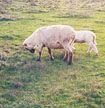The
Callahan family do not buy sheep; all their sheep are
born and raised on the farm. They eat the farm grass,
which is supplemented with some alfalfa.
"Our
sheep have access to the pasture year round" says
Liam. Even when it is dry and there are only seed heads
available, the sheep nibble on this."
In
the last few years the Callahan's have started producing
cheese from raw instead of pasteurized milk. The reason,
Liam says, is that raw milk cheeses retain more of their
distinctive flavor derived from the terroir.(Today,
the majority of the world's cheeses are made from pasteurized
or heat treated milk. Pasteurization means the milk
is heated to a specific temperature and maintained to
partly sterilize it and kill potentially bad bacteria,
such as Listeria.

Some
cheese makers believe the process destroys important
enzymes that aid in the flavor and aging of the cheese.)
With heat-treatment, the temperature of the milk is
raised to a slightly lower temperature to kill bad bacteria.
This method is 'said' to preserve more of the important
enzymes, but opinions vary regarding this. Still other
cheese makers insist on using unpasteurized milk. Raw
milk cheeses or unpasteurized cheeses, are believed
by many to retain more of their distinctive character.
The
Callahans believed that using raw milk (unpasteurized)
was a positive way to increase Bellwether's identity
in the market place.
"The
cheeses are also aged on 'wooden slats"' says Liam.
"This also contributes to the taste of the cheese.
The wood helps to inoculate the rind, allowing for a
smear and mold growth on the cheese, which is eventually
washed off. All of this factors into how the cheese
ripens.
Bellwether Farms identity can also be attributed to
the laws and regulations in the dairy industry with
regards to bacteria. In California, the threshold for
bacteria is much lower than that of Europe. This bacteria,
in part, comes from the manure on the sheep's underbelly
(the animal sleeps on the ground) or is simply sediment
(dirt) which is imparted to the milk during milking.
In California the inspection system is restrictive.
The animals must be 'prepped' before milking to reduce
the level of bacteria in the milk. This means the udder
must be washed prior to milking. After milking, most
farmer do a treatment that prevents a possible migration
of bacteria, such as Mastitis (an infection of the udder),
back into the udder. This in turn produces a 'cleaner'
milk. And while this bacteria contributes toward the
sharpness of European cheese, it gives California cheeses
a sweeter flavor.
By
embracing the concept of terroir, the Callahans started
to feel confident in their cheese making abilities.
Liam created his first cheese called Fresco. The public
responded positively. They entered the cheese in the
American Cheese Society Competition in I996 and won
in two categories, the 'Best Farmstead Sheep Cheese'
and the 'Best Aged Sheep Cheese'. This success encouraged
them to continue developing their own style.
"Over the years I have played with the ripening
conditions. Over time Fresco evolved into what is now
our San Andreas," says Liam. "While this sounds
like a European name for a cheese, it is actually named
after the Earthquake fault that runs under our property.
The recipe is clearly Italian, but the San Andreas is
distinctively a Bellwether cheese.
The
Callahans started making cheese in small batches in
1990. The family had been producing lamb since I986,
which they sold to Bay Area restaurants. In I990 they
rented space at a local farm on weekends and produced
a fresh Fromage Blanc, which they sold at farmer's markets.
In 1992, after travelling to Tuscany and spending a
month touring various farms to learn about the Italian
process, the family returned home and decided to produce
aged cheeses. In thc fall of 1992 they obtained a license
and began production of sheep's milk cheeses on the
premises where the farm now sits, on Carmody Road near
the town of Valley Ford.
"This
was certainly not an economic decision' says Liam. "Something
that you age for four months verses something that you,
can make and sell in a week. It wasn't the smartest
method. But we liked the cheeses, and we wanted to do
something that was more exciting, something where we
were more involved in making the cheese."